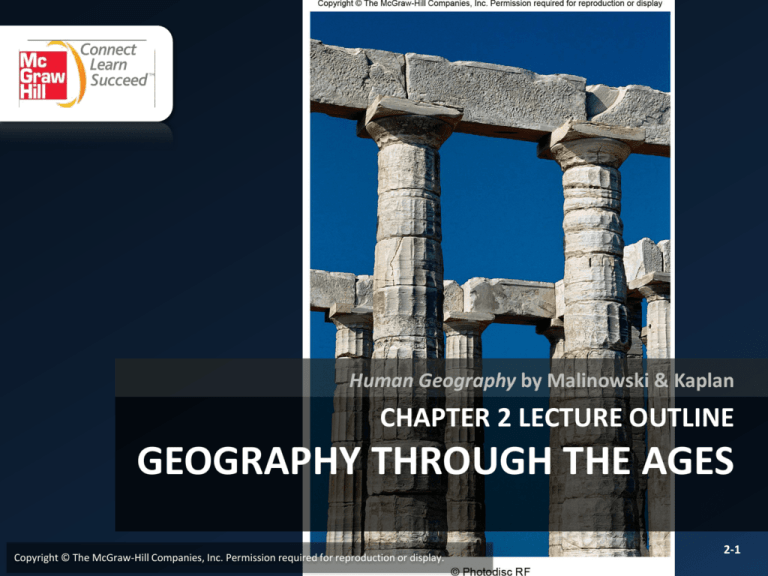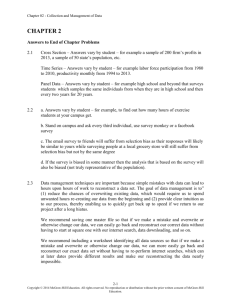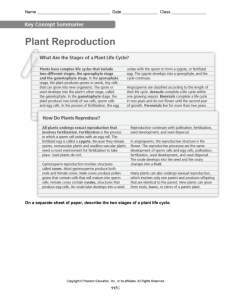CHAPTER 2: Geography Through the Ages
advertisement

Human Geography by Malinowski & Kaplan CHAPTER 2 LECTURE OUTLINE GEOGRAPHY THROUGH THE AGES Copyright © The McGraw-Hill Companies, Inc. Permission required for reproduction or display. 2-1 Chapter 2 Modules • • • • • • • • 2A Ancient Geography 2B The Middle Ages 2C The Age of Exploration 2D The Birth of Modern Geography 2E The Twentieth Century 2F Behavioral and Humanistic Geography 2G Structuralist Geographies 2H Recent Decades Copyright © The McGraw-Hill Companies, Inc. Permission required for reproduction or display. 2-2 2A: Ancient Geography • Early geography focused on description & measurement Copyright © The McGraw-Hill Companies, Inc. Permission required for reproduction or display. 2-3 Early Geographic Figures • Homer • Works such as The Odyssey described Mediterranean areas • Hecataeus • Wrote Ges Periodos, a coastal survey • Herodotus • Included detailed geographic descriptions in his writings • Ptolemy – Wrote an extensive geography of the world in the 2nd century AD • Eratosthenes – Calculated the circumference of the world Copyright © The McGraw-Hill Companies, Inc. Permission required for reproduction or display. 2-4 Ptolemaic World Map Copyright © The McGraw-Hill Companies, Inc. Permission required for reproduction or display. Figure 2A.3 2-5 2B: The Middle Ages • Geographic understanding stagnated in Christian Europe compared to Islamic world and China Copyright © The McGraw-Hill Companies, Inc. Permission required for reproduction or display. 2-6 Travels of Ibn-Battuta Copyright © The McGraw-Hill Companies, Inc. Permission required for reproduction or display. Figure 2B.2 2-7 2C: The Age of Exploration • Wide-reaching expansion of European overseas interest • Prince Henry the Navigator • Employed geographers, cartographers, astronomers and other experts • Long distance navigation was aided by improvements in measuring latitude • John Harrison’s clock (late 18th century) Copyright © The McGraw-Hill Companies, Inc. Permission required for reproduction or display. 2-8 The Columbian Exchange • Important interaction between the Eastern & Western Hemispheres • Crops • Livestock • Disease Copyright © The McGraw-Hill Companies, Inc. Permission required for reproduction or display. 2-9 2D: The Birth of Modern Geography • Alexander von Humboldt • Traveled, collected, & categorized plants / rocks • Promoted appreciation of scientific inquiry • Carl Ritter • Pushed academic geography toward scientific observation • Searched for interconnections among things Copyright © The McGraw-Hill Companies, Inc. Permission required for reproduction or display. 2-10 Environmental Determinism • Theory that human culture is caused the environment a society lives in • Used to overgeneralize people, races, and areas of the world • Generally discredited today as racist and imperialist • Challenged by the “possibilists” led by French geographer Vidal de la Blache Copyright © The McGraw-Hill Companies, Inc. Permission required for reproduction or display. 2-11 Environmental Determinism Figure 2D.3 Possibilism Copyright © The McGraw-Hill Companies, Inc. Permission required for reproduction or display. 2-12 2E: The Twentieth Century • 1920s: Carl Sauer emphasizes the changing cultural landscape • 1930s: Increasing focus on regional geography • Mid-Century: Rise in systematic geography • 1950s: Quantitative revolution • Positivism Copyright © The McGraw-Hill Companies, Inc. Permission required for reproduction or display. 2-13 Subdisciplines of Geography Copyright © The McGraw-Hill Companies, Inc. Permission required for reproduction or display. Figure 2E.2 2-14 2F: Behavioral & Humanistic Geography • Behavioral Geography – focus on the psychological processes that underlie geographic decisions • Mental Maps – representations of the real world that we have in our heads • Humanistic Geography – a greater emphasis on the meaning that humans places on the environment & surroundings Copyright © The McGraw-Hill Companies, Inc. Permission required for reproduction or display. 2-15 Mental Map Copyright © The McGraw-Hill Companies, Inc. Permission required for reproduction or display. Figure 2F.1 2-16 Yi-Fu Tuan • Topophilia – love of place • Topophobia – fear of place Copyright © The McGraw-Hill Companies, Inc. Permission required for reproduction or display. 2-17 2G: Structuralist Geographies 1 • Structuralism – A set of social theories that generally look for deep structures or theories that guide human actions and societies – Structure vs. Agency Copyright © The McGraw-Hill Companies, Inc. Permission required for reproduction or display. 2-18 Figure 2G.1 Copyright © The McGraw-Hill Companies, Inc. Permission required for reproduction or display. 2-19 2G: Structuralist Geographies 2 • Structuration – A theory that human action is partly constrained by social structures governed by laws and social norms and that societies can choose to either reproduce or change their behaviors. • Geographic focus on locales • Marxism – For geographers, a focus on spatial inequality and how capitalism influences the world around us Copyright © The McGraw-Hill Companies, Inc. Permission required for reproduction or display. 2-20 2H: Recent Decades 1 • Modernism • 20th century trends in art, architecture, & literature that broke from tradition • Postmodernism – A complex set of ideas that arose as a criticism of modernism and that, in general, rejects that everything in the world is rational or neatly categorized. Copyright © The McGraw-Hill Companies, Inc. Permission required for reproduction or display. 2-21 Modernist vs. Postmodernist Copyright © The McGraw-Hill Companies, Inc. Permission required for reproduction or display. Figure 2H.1 2-22 2H: Recent Decades 2 • Poststructuralism • Social theories that question structuralism’s search for deep structures and focus on individuals and local differences. • In geography, many poststructuralists focus on how marginalized groups view and use landscapes. • Feminism • Theories and philosophies that focus on the status and rights of women. Copyright © The McGraw-Hill Companies, Inc. Permission required for reproduction or display. 2-23 Geographic Information Systems • “GIS” • Computer systems that can capture, store, analyze, and output geographic information Copyright © The McGraw-Hill Companies, Inc. Permission required for reproduction or display. 2-24







